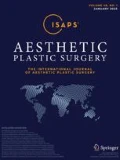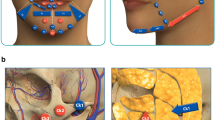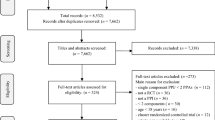Abstract
Background
This descriptive study investigates cosmetic surgery experience, awareness of side effects, self-esteem, and acceptance of cosmetic surgery (ACS) and aims to identify factors that affect ACS.
Methods
Data on 398 randomly selected participants from a panel of sex-stratified adults in their 20s and 30s registered online with a Korean survey company were collected in September 2019. The data were analyzed using descriptive statistics, crosstabs, Chi-square test, ANOVA, Pearson’s correlation, and multiple linear regression.
Results
Among the subjects, 47.2% were male and 52.8% were female. The average age of the subjects was 29.98 years. While 91.7% of the subjects previously acquired information on side effects related to cosmetic surgery, the most frequent source was from “bus stops and subway stops,” reported by 83.6% of them. Blepharoplasty was the most frequently performed procedure reported by 50 of the 89 subjects (22.4%) who underwent 1 or more cosmetic surgery procedures. Among 187 subjects (47.0%) considering cosmetic surgery in the future, “botulinum toxin” was the most frequently considered procedure. ACS of the subjects was higher with employment (β = .15, p < .001), previous experience with cosmetic surgery (β = .22, p < .001), consideration for future cosmetic surgery (β = .49, p < .001), and lower appearance satisfaction (AS) (β = −.10, p = .008), and the explanatory power of these variables was 41.7% (F = 72.08, p < .001).
Conclusions
Most of the subjects in this study were aware of the side effects of cosmetic surgery, and about half were considering cosmetic surgery in the future. Employment status, previous experience with cosmetic surgery, consideration for future cosmetic surgery, and AS were found to be factors affecting ACS. Correlations between age, BMI, ACS, AS, depression, and self-esteem were identified.
Level of Evidence V
This journal requires that authors assign a level of evidence to each article. For a full description of these evidence-based medicine ratings, please refer to the table of contents or the online instructions to authors www.springer.com/00266.

Similar content being viewed by others
References
Karupiah P (2012) Modification of the body: a comparative analysis of views of youths in Penang, Malaysia and Seoul, South Korea. J Youth Stud 16(1):1–16. https://doi.org/10.1080/13676261.2012.693588
Gallup Korea (2015) Appearance and recognition of cosmetic surgery—1994/2004/2015 compare [Internet]. Gallup Korea, Seoul [cited 2019 Dec 30]. http://www.gallup.co.kr/gallupdb/reportContent.asp?seqNo=656
Korea Consumer Agency (2019) 2018 Consumer Damage Remedial Annual and Casebook [internet]. Korea Consumer Agency, Chungcheongbuk-do [cited 2019 Dec 30]. http://www.kca.go.kr/odr/pg/pi/osPgAnnualExamW.do
The Economist (2013) Plastic makes perfect [Internet]. The Economist, London [cited 2019 Dec 30]. http://www.economist.com/blogs/graphicdetail/2013/01/daily-chart-22
ISAPS (2011) ISAPS Global Statistics [Internet]. International society of aesthetic plastic surgery, Hanover (NH) [cited 2019 Dec 30]. http://www.isaps.org/news/isaps-global-statistics
Shilling C (2003) The body and social theory, 2nd edn. Sage Publications, London
Bordo S (1993) Unbearable weight: feminism, western culture and the body. The University of California Press, Berkely
Jung JW (2006) The meaning and phenomenon of consumption culture for body in consumption society. Consum Cult Study 9(1):83–101 (in Korean)
Korea Consumer Agency (2015) Asymmetry complaints on side effects of plastic surgery [Internet]. Korea Consumer Agency, Chungcheongbuk-do [cited 2019 Dec 30]. https://www.kca.go.kr/kca/sub.do?menukey=5084&mode=view&no=1001624993
Swami V, Arteche A, Chamorro-Premuzic T, Furnham A, Stieger S, Haubner T, Voracek M (2008) Looking good: factors affecting the likelihood of having cosmetic surgery. Eur J Plast Surg 30(1):211–218. https://doi.org/10.1007/s00238-007-0185-z
Henderson-King D, Henderson-King E (2005) Acceptance of cosmetic surgery: scale development and validation. Body Image 2(2):137–149. https://doi.org/10.1016/j.bodyim.2005.03.003
Kim YA, Chae DH, Kim HL (2017) Factors affecting acceptance of cosmetic surgery among undergraduate students. J Korea Contents Assoc 17(1):455–464. https://doi.org/10.5392/JKCA.2017.17.01.455(in Korean)
Seo YA, Cho Chung HI, Kim YA (2019) Experience and acceptance of cosmetic procedures among South Korean women in their 20s. Aesthetic Plast Surg 43(2):531–538. https://doi.org/10.1007/s00266-018-1257-0
Ambro BT, Wright RJ (2010) Depression in the cosmetic surgery patient. Facial Plast Surg 26(4):333–338. https://doi.org/10.1055/s-0030-1262309
Naraghi M, Atari M (2015) A comparison of depression scores between aesthetic and functional rhinoplasty patients. Asian J Psychiatr 14:28–30. https://doi.org/10.1016/j.ajp.2015.01.009
Kim YA, Cho Chung HI (2018) Side effect experiences of South Korean women in their twenties and thirties after facial plastic surgery. Int J Womens Health 14(10):309–316. https://doi.org/10.2147/IJWH.S163991
Secord PF, Jourard SM (1953) The appraisal of body cathexis and the self. J Consult Psychol 17(5):343–347
Rosenberg M (1965) Society and the adolescent self-image, 1st edn. Princeton University Press, Princeton
Cho MJ, Kim KH (1993) Diagnostic validity of the CES-D (Korean version) in the assessment of DSM-III-R major depression. J Korean Neuropsychiatr Assoc 32(3):381–399 (in Korean)
ISAPS (2014) ISAPS Global Statistics [Internet]. International Society of Aesthetic Plastic Surgery, Hanover (NH) [cited 2019 Dec 30]. http://www.isaps.org/news/isaps-global-statistics
Mazzeo SE, Trace SE, Mitchell KS, Gow RW (2007) Effects of a reality TV cosmetic surgery makeover program on eating disordered attitudes and behaviors. Eat Behav 8(3):390–397. https://doi.org/10.1016/j.eatbeh.2006.11.016
Swami V, Chamorro-Premuzic T, Bridges S, Furnham A (2009) Acceptance of cosmetic surgery: personality and individual difference predictors. Body Image 6(1):7–13. https://doi.org/10.1016/j.bodyim.2008.09.004
Orth U, Robins RW, Roberts BW (2008) Low self-esteem prospectively predicts depression in adolescence and young adulthood. J Pers Soc Psychol 95(3):695–708. https://doi.org/10.1037/0022-3514.95.3.695
Xie B, Unger JB, Gallaher P, Johnson CA, Wu Q, Chou CP (2010) Overweight, body image, and depression in Asian and Hispanic adolescents. Am J Health Behav 34(4):476–488
Figueroa C (2003) Self-esteem and cosmetic surgery: is there a relationship between the two? Plast Surg Nurs 23(1):21–24
Park LE, Calogero RM, Young AF, Diraddo AM (2010) Appearance-based rejection sensitivity predicts body dysmorphic disorder symptoms and cosmetic surgery acceptance. J Soc Clin Psychol 29(5):489–509. https://doi.org/10.1521/jscp.2010.29.5.489
Jung JH, Hwang CS (2016) Associations between attitudes toward cosmetic surgery, celebrity worship, and body image among South Korean and US female college students. Fash Text 3(17):1–14. https://doi.org/10.1186/s40691-016-0069-6
Funding
This work was supported by the National Research Foundation of Korea (NRF) grant funded by the Korean government (MSIT; Ministry of Science and ICT) (no. NRF-2017R1C1B5016043).
Author information
Authors and Affiliations
Corresponding author
Ethics declarations
Conflict of interest
The authors declare that they have no conflicts of interest to disclose.
Ethical Approval
This study was approved by the Institutional Review Board (JJNU-IRB-2019-036).
Informed Consent
Informed consent was obtained from all participants.
Additional information
Publisher's Note
Springer Nature remains neutral with regard to jurisdictional claims in published maps and institutional affiliations.
Rights and permissions
About this article
Cite this article
Seo, Y.A., Kim, Y.A. Factors Affecting Acceptance of Cosmetic Surgery in Adults in Their 20s–30s. Aesth Plast Surg 44, 1881–1888 (2020). https://doi.org/10.1007/s00266-020-01761-8
Received:
Accepted:
Published:
Issue Date:
DOI: https://doi.org/10.1007/s00266-020-01761-8




